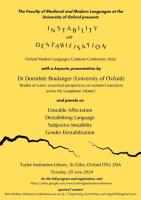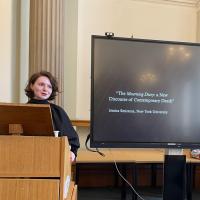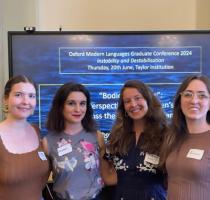
On Friday the 20th of June 2024, graduate students and early career researchers gathered to navigate notions of instability and destabilisation. Dr Dorothée Boulanger, Career Development Fellow in Women's, Gender and Sexualities Studies, gave the keynote speech, ‘Bodies of Water: Ecocritical Perspectives on Women’s Narratives Across the Lusophone Atlantic’. Water, in its fluidity, refuses to be contained. Violently separated from the land, Afro-Brazilian women articulate diaspora via the perpetual metamorphosis of their mirror element. Rain, tears, dew, frost, oceans, waves and floods become the combined agent of female emancipation. Dorothée presented this more-than-human resistance via Mozambican writer Paulina Chiziane's novel, O alegre canto da perdiz (The Joyful Song of the Partridge) and works by Afro-Brazilian author Conceição Evaristo. For Chiziane, water is conflictual and symbolic of the nonconforming woman.[1] The opening scene of O alegre canto da perdiz depicts the protagonist, Maria, bathing naked in the lotus position. She challenges the local women who scream, attempting to eradicate her presence. Maria swims away 'like a nymph rolling through the waves [...] protected [...] on a throne of water'.[2] Uprooted from her spiritual, cultural and natural identity, the unruly woman, like water, evokes the pluralities of African existence. Evaristo's prose affirms the need for Afro-Brazilians to articulate their presence but does so via the corporeal. Tears are a leitmotiv in the short story Olhos d'água (Eyes of Water) which signal motherhood and nourishment. In the opening scene, the narrator reminisces on her mother's eyes 'indistinguishable from nature [...] it rained, she cried!'.[3] Oxúm, the deity of freshwater and fertility, is also mentioned. Bodies of water hold and transmit stories, nurturing love and comprehension across generations. For both authors, writing women as water represents hope and struggle against the historical assault of patriarchy, racism and extractivism against African and Black females.
As well as Dorothée's keynote, there were panels on Unstable Affectation, Destabilising Language, Subjective Instability and Gender Destabilisation. Lena Stottele discussed narrating exhaustion in Thomas Mann's Doktor Faustus (1947). Once everything has already been said, it is precisely the phenomenon of exhaustion which is left to discuss. Lena argued that exhaustion acts as a stabilising structural element of the story as the protagonist's fictional biography is interwoven with the history of World War II. Exhaustion simultaneously destabilises the narrative principle as a reliable biographical account becomes sapped over the course of the novel. Clara Busch considered how hate speech and populist movements use negative emotions as weapons for exclusion of, and violence against, marginalised groups. Anger, contempt and violence can, however, be productive tools of feminist resistance. Jessica Smietana, a doctoral student at New York University (NYU), presented the mourning diary as a response to destabilisation caused by grief. Simone de Beauvoir's Une mort très douce (1964) and Céline Huyghebaert’s Le drap blanc (2019) reconfigure contemporary loss as aesthetic yet mundane, marked by the labour of care as opposed to metaphysical significance. The mourning diary emerges as a new framework for analysing the disturbance of death, demonstrating a renewal of the language and literature of loss.

Evoking Destabilising Language, Beverly Adrian examined the ideas of counter-revolutionary philosopher, Louis de Bonald, who believed that the French language reached its apogée during the reign of Louis XIV when France enjoyed the greatest degree of political order and stability. The eighteenth century, according to Bonald, accompanied a resurgence of philosophical scepticism which undermined moral values, culminating in revolution and linguistic decadence. Tessa Haining discussed 'minor literature' – when a writer from a marginal group challenges the dominance of the majority culture by using its language in disruptive ways. She traced Kafka's Jewish identity as a new structure for understanding his life and work. Hannah Overton-Gill, a doctoral student at the University of Birmingham, examined translation and revolution in Madame de Rochmondet's Études sur la traduction de l'anglais (1830). Hannah contended that Rochmondet's work gestures toward the destabilisation of translation theory and practice while challenging prevailing attitudes towards women’s roles.
For the panel on Subjective Instability, Lingchen Huang dissected the unstable parameters of the self in Clarice Lispector's Perto de coração selvagem (1943). Lispector aligns herself with post-humanist views which reject the idea of a fixed, unified self. The individual is fluid and adaptive, embracing uncertainty via reorganisation with the environment. Orestis Tzirtzilakis examined how videography became a tool for Greek artists to disrupt political discussions about identity. Audio-visual technology in the work of Lyda Papakonstandinou approached reality in fresh, destabilising ways. Roberto Interdonato explored alienation in relation to space via the work of Italian writer, Anna Maria Ortese, and Austrian author, Ingeborg Bachmann. By focusing on the connection between individuals and the post-World War II cities of Milan and West Berlin, both women reflect upon how the anxiety of modern cityscapes shape human experiences.
Finally, with regard to Gender Destabilisation, Anaïs Bouzou, a doctoral student at NYU, surveyed the intersection of environmental, queer and trans studies via contemporary texts by non-binary authors, Al Baylac and Camille Cornu. Botany destabilises structures of thought, language and writing. The queer body embraces multiplicity and invents a botanical language permitting a new, transitioning discourse. Hanrui Wu analysed the deconstruction of colonialism and patriarchy via a comparative study of Luanda, Lisboa, Paraíso (2018) and Caderno de memórias coloniais (2009). In the 1970s, Portuguese overseas colonies gained independence and those who had settled abroad returned to their homeland (retornados). Some Assimilados also chose to go to Portugal. The two protagonists', Isabela and Cartola, realise that their racial identity and fluid sexuality cannot belong to any group or be categorised. They establish close emotional and physical connections with same-sex friends, becoming, to some extent, "emasculated". Arthur Wotton discussed (re)constructing masculinity in the novel of the Mexican revolution. This turbulent backdrop served as fertile ground for the quest for a 'model Mexican masculinity'.
The conference was a wonderful opportunity to explore the many facets of instability and destabilisation. While associated with destruction, all the presentations – despite spanning different languages, periods and mediums – recognised the theme's concurrent connection with renewal.

[1] Chiziane, Paulina, The Joyful Song of the Partridge (Brooklyn: Archipelago Books, 2024), p. 7.
[2]Tavares, Maria, No Country for Nonconforming Women: Feminine Conceptions of Lusophone Africa, (Cambridge: Legenda, 2018).
[3] Chiziane, Paulina, The Joyful Song of the Partridge Op. Cit., p. 7.
[4] As quoted by Dr Dorothée Boulanger in her presentation 'Bodies of Water: Ecocritical Perspectives on Women’s Narratives Across the Lusophone Atlantic'.— All ideas discussed in this paragraph come from Dr Dorothée Boulanger's presentation.